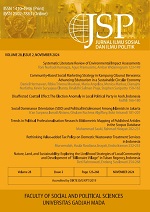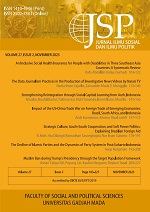The Paradox of Distance in Decentralized Indonesia
https://doi.org/10.22146/jsp.10916
Gabriel Lele
(1*)
(1) Universitas Gadjah Mada
(*) Corresponding Author
Abstract
One of the most important promises of decentralization is to bring government closer to the people through improved public services and decision making. In contrast to this promise, the implementation of decentralization in Indonesia seems to create farther distance between government and the people resulting in the paradox of distance. This article argues that the paradox of distance in decentralized Indonesia is institutionally engineered. It is due mainly to unclear mechanisms for the people to hold government accountable and this stems from two main factors. The first one refers to the politics of functional assignment between central and local governments which benefits central government more than local government. The second factor is the macro institutional arrangements on the relationships between local government and the people where there is almost no way for local people to hold their government accountable or punish the underperformed local government. This article recommends significant transformation in the way the central government manages functional assignment to enable local governments to be more responsive to local people as well as reform of key political arrangements to make them more responsive and accountable to local people.
Keywords
decentralization; institution; paradox of distance; functional assignment; desentralisasi; institusi
DOI:
https://doi.org/10.22146/jsp.10916
Article Metrics
Abstract views : 3265
|
views : 2642
Refbacks
There are currently no refbacks.
Copyright (c) 2016 Jurnal Ilmu Sosial dan Ilmu Politik
<div class="statcounter"><a title="Web Analytics" href="http://statcounter.com/" target="_blank"><img class="statcounter" src="//c.statcounter.com/10932543/0/2e122c85/0/" alt="Web Analytics"></a></div> <div class="statcounter"><a title="Web Analytics Made Easy - StatCounter" href="http://statcounter.com/" target="_blank"><img class="statcounter" src="//c.statcounter.com/10932543/0/2e122c85/0/" alt="Web Analytics Made Easy - StatCounter"></a></div> View My Stats























